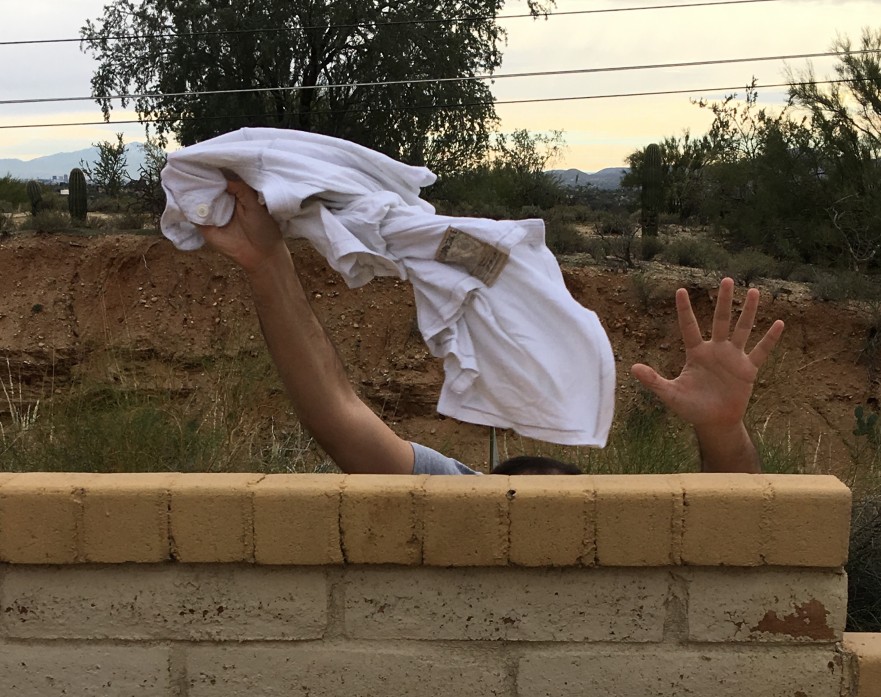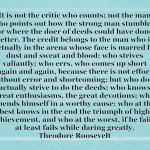Bill Ferriter, In a recent Tempered Radical post, The Poisonous Mythology of Grittiness, relates a recent conversation about grit that he had with John Spenser. The crux of their discussion was that grit is too often defined as working through set-backs and “buckling down and getting it done.” Instead Bill and John agree that Design Thinking provides better opportunities to develop grit than a willingness to “struggle through miserable experiences.” Bill quotes John:
“Design thinking builds grit by giving a lot of slack. We have this idea that perseverance comes form a buckle down and get it done mentality. Design Thinking says you develop perseverance through tons of iterations and freedom to make mistakes and time to make revisions and improvements.”
(Please read Bill’s entire post and ponder his proposition that teachers should redesign their spaces rather than rationalize that bad lessons build grit.)
Now before I go on, I dig grit as a valuable part of one’s disposition because it increases one’s chances of advancement. Yet why is quitting – as in giving up – in and of itself, nearly always considered failure?
I’d say that knowing when to quit demonstrates strength and is both a valuable job skill and a virtuous life skill.
And all this reminds me of a question I ask my students early in the semester: When do you know it’s time to move on?*
Here are some of the more thoughtful answers from this semester. Some clearly refer to giving up on a relationship; others, a goal; still others, a dream:
- When the other person gives up
- When there’s no hope
- When time passes and you don’t care about what you were fighting for anymore
- When there’s not the tiniest chance it will happen
- Society wants me to say never. But let’s be real, it’s until you get hungry
- When you forget about it
- When time has passed and no change has happened
- When what you want to move on from gets in your way
- When you’re tired of holding a grudge
- When you’re stressing too much
- When it’s causing you pain
- When you know you can’t have another chance
- When there’s no hope and no way out
- When you totally understand
- I just get a gut feeling
- When you know in your mind it’s not worth it
- When you stop being sad
- When you’re too good for something
- When you’ve spent too long questioning yourself
- When I’m bored
- When you’re ready for the next step
- When your you’re not getting attention or achieving anything new
- When everyone is ready
- When there’s no point
And one from a previous year that’s always stayed with me:
When is it time to move on? When you’ve got no other choice.
Reading through the list a couple of times makes me think that sometimes it takes more grit to quit on something you don’t care about, or totally understand, or hurts than it does to “buckle down and get it done” – particularly when you’ll face being called a quitter or a failure.
And with that I think it’s time to move on from this post.
*The question is from ThoughtQuestions, a great source of bellwork questions that I like because I get so tired of aligning bellwork with my learning objectives.
(Photo credit: Seth and August Merz)










Comments 3
I am definitely going to check out the ThoughQuestions website. I like this post. I agree with pretty much everything. So the challenge becomes giving our students enough confidence and sense of self to be confident in their decisions to give up selectively. And I agree with you, that is a form of grit in itself. I know that as a teacher, probably one of the most heartbreaking things in the second ten years of my career has been deciding time and again to give up on one thing or another in order to better focus my efforts elsewhere, or because the wall I was banging my head against was not going anywhere. When you think about it, the option to selectively give up is the only way to survive long-term in any endeavor.
Hi Sandy,
Thanks for posting this blog. It also makes me think about creating space for teachers to have the confidence and sense of self to be confident in their decisions to give up selectively. We continue to ask teachers to do more with less and many of them just except that as teaching today. How do we move past that mindset and give them the skills to say, no thank you I can not commit to that right now?
Thanks for the post, Sandy. I just checked out ThoughtQuestions and added some for my students to respond to in their writer’s notebooks. Regarding knowing when to say no and quit, one of the best pieces of advice I was ever given was during my National Board candidate year. A mentor told me to quit all my extra curricular activities (drama club, stu co, etc.). I balked but ended up quitting everything. It helped me to be a successful candidate and could resume activities as usual the next year. Good advice!